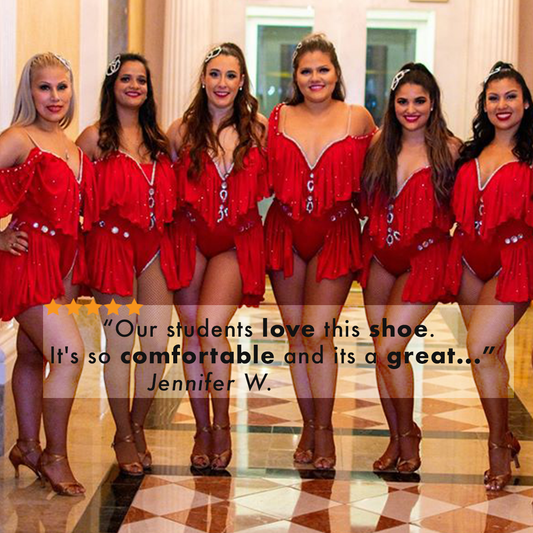
Salsa is a street dance that grew into a global phenomenon. While different variations and styles of salsa dance have emerged, it's not unusual for salseros and salseras to join a salsa club or community to share the passion for dance!
If you’re a beginner, you might be wondering about the difference between social dancing and performance. You might’ve also heard about social dancers being good performers and good performers being bad at social dancing. Social dancing and performance are similar to a certain degree. The difference is the way you are challenged as a dancer in different settings.
Every dancer performs differently in different settings. How well a dancer dances boil down to his or her training, experience, and comfortability in the said setting. That’s perhaps the reason why some of the most amazing salsa dancers out there tend to have average social dancing skills and vice versa.
But what’s the difference between social dancing and performance? Which one is better? Let’s find out:
Social Dancing
Social dancing is all about having fun, it’s about meeting and dancing with different partners and sharing the love for Latin dance. Nothing is rehearsed and if you mess a move up, you won’t lose a point nor get a disapproving look from spectators.

- It’s a social event
- No choreography
- No specific music
- Dance with multiple partners
- Add your own twist to the song
- Be a good leader or follower
- Adapt and/or improvise the dance moves
The dance moves are based on leading and following. You can freestyle the dance moves and add your unique styling to spice things up. Social dancing is common in salsa parties, clubs, and dance schools. As long as you are not hurting anyone, you smell good, and you love salsa dancing, you can jump in and join the fun.
To be a great social dancer, you should be quick to adapt to different dance moves and you must be a great leader or follower. You should always watch your space because socials can be crowded and you don’t want to bump into or step on someone’s toes. You should also have a good grasp of musicality so you can interpret the songs well.
Performance
As the name implies, performance is all about performing in front of an audience for entertainment. You’re not there to have fun or improvise a dance move you’ve just created on the fly, you’re there to entertain.

- It’s an entertainment event
- Takes hours of practice to perfect the routine
- Demands repetitions and rehearsals
- The routine sticks to general choreographic principles
- Dance to specific music or song
- Dance solo, with a partner, or with a group of dancers
- Leaves no room for improvisation or free-styling
Generally, performance pieces involve months of training, lots of repetitions, and hours of practice to perfect the choreography. With performance pieces, you can dance solo, with a dance partner (couple) or with a group of dancers. The dance routines tend to stick to general choreographic principles although the styling depends on the choreographer/s or dancer/s themselves.
The point of all the long hours of rehearsals and repetitions is to learn the choreography by heart. This makes performance different from social dancing, which has less to do with entertaining and more to do with dancing for fun.
If you are dancing solo in a performance, the timing of the dance movements should be impeccable. If you are dancing with a partner, your trust and connection with the other dancer should be strong. If you are a part of a dance troupe, you need to keep the formation and spacing in check during the performance.
Essentially, being a part of performance means you’re an entertainer. You should have the right attitude to put on a good show. During a performance, you have to demonstrate your sharpness, timing, technique, and showmanship to connect with your audience. You must learn how to handle pressure well to perform the dance perfectly.

Social Dancing VS Performance: Which is Better?
Now that you know the difference between social dancing and performance, which one is better for you? Should you dance socially or is it better to train as an entertainer? The answer will depend on you, your comfortability dancing in certain settings, what skills you’d like to hone, and what challenges you as a dancer.
When it comes to social dancing, you’ll develop your lead and follow skills. The relaxed setting allows you to improvise. You’ll also improve your attentiveness for better timing and interpretation. You can connect with your dance partner, build trust, and get out of your comfort zone.
Another great thing about joining social dancing is that you can strengthen your reflexes and handle spontaneity with ease.

On the other hand, performance is all about having the discipline to train hard until you learn the routine by heart. Since a performance piece is designed to entertain, you’ll learn how to build a better stage presence and demonstrate your dance skills despite the pressure. Since you’re investing a lot of time, money, and effort into perfecting a performance, you’re more focused on the choreography, your flair, and your costumes.
If you’re all about having fun, feeling the music, connecting with your dance partner and you’re a huge fan of street dance, you will love social dancing. On the other hand, if you’re all about the choreography, the technique, and the routine, you’re a dance performer at heart.
No matter what choice you go with, it’s important to invest in the right gears. Here at Yami Shoes, our goal is to bring you the best Latin dance shoes at reasonable prices. Check out our growing collection of Latin dance shoes and feel the Yami difference!
References
https://www.salsaconson.com/social-dancing-vs-performing/
http://www.thisbusinessofdanceandmusic.com/Article-socialvschoreography.html
https://www.salsaforums.com/threads/performers-and-social-dancers.37870/
https://www.dance-forums.com/threads/performer-vs-social-dancer.14126/
http://www.azucarottawa.com/social-dancing-vs-performance-vs-competitive-dancing/








